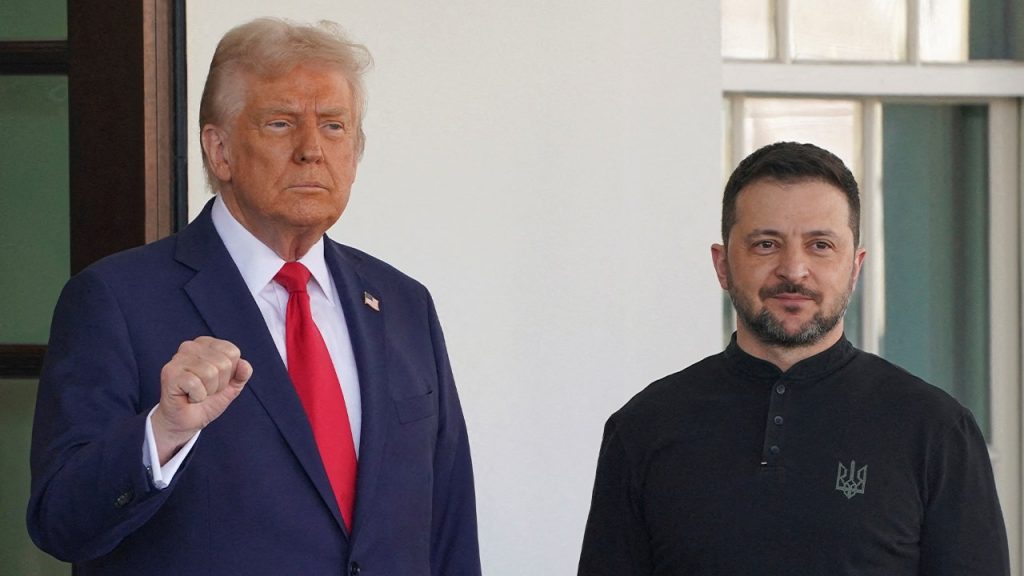In a recent interview with NBC’s “Meet the Press,” President Donald Trump expressed his frustration with the ongoing stalemate in the Russia-Ukraine conflict. He indicated that the U.S. may withdraw from mediation efforts if no progress is made between the two sides. Trump acknowledged the “tremendous hatred” that exists between Russian President Vladimir Putin and Ukrainian President Volodymyr Zelenskyy, which could hinder negotiations and overall peace efforts.
| Article Subheadings |
|---|
| 1) Trump Discusses Stalemate in Peace Talks |
| 2) The Context of Recent Comments |
| 3) Insights from Ukrainian President Zelenskyy |
| 4) Secretary of State’s Statement on Mediation |
| 5) The Broader Implications for U.S. Foreign Policy |
Trump Discusses Stalemate in Peace Talks
In a striking revelation during his interview, President Trump articulated the growing frustration with the lack of tangible progress in peace talks between Ukraine and Russia. He noted that the United States would not act as a mediator indefinitely, hinting at a potential withdrawal from negotiations if both parties fail to demonstrate a commitment to finding common ground. Trump emphasized that the ongoing losses, currently averaging 5,000 soldiers a week, underscore the urgency for substantive dialogue to resolve the conflict.
The Context of Recent Comments
Trump’s comments come at a time of heightened tension, especially after Russian forces recently targeted civilian areas in Ukraine with missile strikes. He elaborated on social media, criticizing Putin’s actions and questioning whether the Russian leader is genuinely interested in pursuing peace. “There was no reason for Putin to be shooting missiles into civilian areas,” Trump stated, suggesting that such actions indicate a lack of commitment to peace negotiations. The escalating violence has further complicated the prospects for resolution and increased skepticism regarding the sincerity of the Russian stance.
Insights from Ukrainian President Zelenskyy
Ukrainian President Volodymyr Zelenskyy has also voiced his concerns following public exchanges with Trump. He drew attention to the potential negative ramifications of the public dispute for both sides, indicating that it could hinder cooperative efforts moving forward. Zelenskyy stressed that any misunderstandings between the leaders of the two nations could further complicate the peace process, exacerbating the already dire situation. His statements underscore the importance of maintaining diplomatic channels, even during turbulent times.
Secretary of State’s Statement on Mediation
Adding to the dialogue, Secretary of State Marco Rubio labeled it “silly” to establish a timeline for U.S. withdrawal from mediation, emphasizing the fluidity of the situation. Rubio indicated that a critical week was forthcoming, which would potentially shape the future of U.S. involvement in peace talks. He acknowledged the complexities involved in the negotiations, noting the unpredictable nature of international diplomacy, especially in conflict zones. Furthermore, his comments suggest that U.S. officials are carefully monitoring developments before making any definitive decisions.
The Broader Implications for U.S. Foreign Policy
The current state of affairs between Ukraine and Russia poses significant implications for U.S. foreign policy. With the geopolitical landscape continually shifting, the U.S.’s role as a mediator in international conflicts will likely come under scrutiny as public sentiments and strategic interests evolve. Trump’s remarks reflect a broader debate within the political arena regarding the effectiveness of U.S. involvement in foreign conflicts and the obligation to prioritize American interests. The ultimate outcome of these developments could reshape American attitudes toward intervention and diplomacy on the global stage.
| No. | Key Points |
|---|---|
| 1 | Trump indicates a potential U.S. withdrawal from peace talks if no progress is made. |
| 2 | The death toll among soldiers remains a key concern in the ongoing conflict. |
| 3 | Zelenskyy warns that public disputes could harm cooperative efforts. |
| 4 | Secretary of State Rubio emphasizes the unpredictability of U.S. mediation. |
| 5 | The implications for U.S. foreign policy could reshape future international involvement. |
Summary
In conclusion, President Trump’s remarks regarding the stagnation in Russia-Ukraine peace talks reveal significant frustrations and concerns about the escalating violence and loss of life. Trump’s conditional approach to U.S. mediation, coupled with Zelenskyy’s insights on the importance of maintaining diplomatic dialogue, highlights the complexities of international negotiations. As the U.S. navigates its role in this conflict, the implications for foreign policy and international relations remain critical for future engagement.
Frequently Asked Questions
Question: Why is the U.S. considering withdrawal from peace talks?
The U.S. may withdraw from peace talks if there is no demonstrated progress between Ukraine and Russia, as stated by President Trump, who emphasized the need for a commitment to dialogue and resolution.
Question: What role is Ukraine’s President Zelenskyy playing in the negotiations?
President Zelenskyy is actively engaged in the negotiations and is vocal about the challenges posed by public disagreements, highlighting their potential to harm mutual efforts for peace.
Question: How does the current conflict impact U.S. foreign policy?
The stalemate in the Russia-Ukraine conflict poses significant implications for U.S. foreign policy, raising questions about the effectiveness of American mediation in future international disputes and strategic interests.


